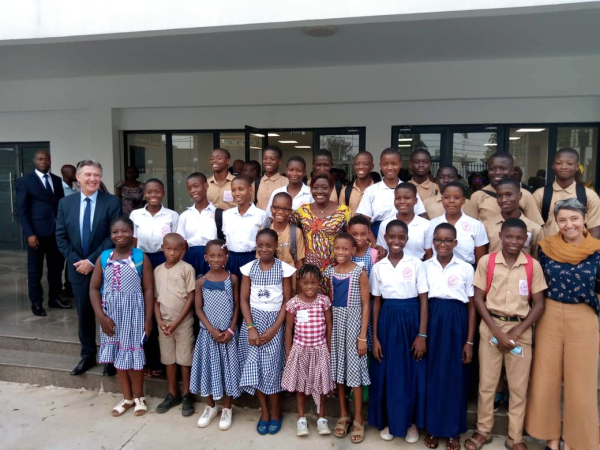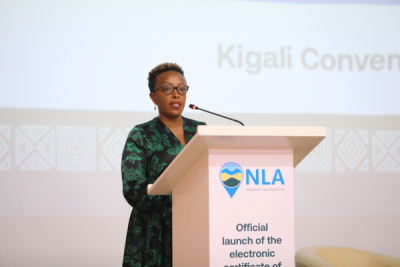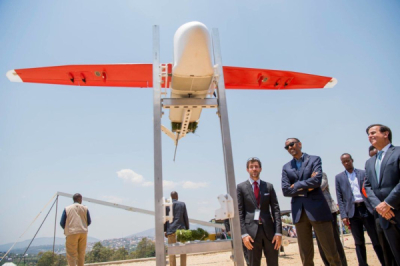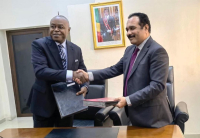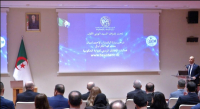
Public Management (594)
Over the past few years, Côte d'Ivoire has made a number of investments to advance remote education. With the new platform, the country positions itself as a regional leader in the digitalization of education.
Last Tuesday, in Abidjan, the Ivorian Minister of National Education and Literacy, Mariatou Koné, inaugurated the platform "Mon école à la Maison," dedicated to remote education.
The new platform aims to support both students in and out of school in their daily learning. For Mariatou Kone, its launch carries several meanings.
"The first is that Côte d'Ivoire has been involved in distance learning initiatives for several years and the government intends to stay the course to develop this digital and innovative educational offer. Secondly, the Ivorian government offers free lessons, exercises, films, and even textbooks to students, parents, and teachers who will regularly visit the platform." "This is essentially educational but it is also a tool for interactive dialogue," she added.
For several years now, Côte d'Ivoire embarked in the digitization of its education sector. After the political and military crisis, which shook the country in 2004 and led to the closure of schools, the government started dematerializing education by launching several projects. In 2020, the coronavirus pandemic accelerated the projects being implemented.
The "Mon école à la Maison" platform is one of the initiatives born from Covid-19. It is a directory of all the resources of the national education system. It has nearly 4,000 lesson sheets, 5,000 exercises and primary school textbooks, 624 educational clips of 15 minutes maximum, entire courses, 2,000 interactive exercises (Quizzes), and at least 150 practical worksheets.
According to Marc Vincent, UNICEF representative in Côte d'Ivoire, this platform will benefit more than 6 million children in preschool, school, and general secondary education. "This initiative is the first on the African continent. Côte d'Ivoire is now the leader in Africa in the use of technology," he added.
Samira Njoya
The digital component of Congo's 2022-2026 National Development strategy plans the construction of a number of tech infrastructures. To fulfill that ambition, the government is multiplying partnerships with key partners.
Last Friday, Congolese Digital Minister Leon Juste Ibombo welcomed a delegation of the Dubai-based consortium Presight ai Limited-G42.
During the audience, the parties discussed the finalization of a recent partnership aimed at funding several projects that will improve digitization and the construction of key tech infrastructures, which will benefit the population.
"Our partners came with documents that will allow us to reach out to the Ministry of Finance for the financing agreement before the implementation phase. With the negotiations concluded, we will move to finalize the project," Leon Juste Ibombo said.
The visit of the Emirati team is the result of a cooperation process that started a few months ago. Indeed, on March 28, 2022, in the United Arab Emirates, Congo signed a partnership agreement with Presight ai LimitedG42 to combine their digital transformation efforts and expertise.
The agreement is one of the partnerships sealed by Congo for the implementation of its 2022-2026 national development strategy for a strong and diversified economy. In recent months, the country has signed similar agreements with international firms including Indian ATDXT and Canadian Casimir Network. The agreement with Casimir Network provides for the training of local tech talents as well as the construction and operationalization of a data center that will host the country's blockchain services.
Samira Njoya
Rwanda has undergone a major digital transition in recent years. Several sectors are changing, including the land sector, where reform will now allow the online issuance of land titles.
Last Friday, Rwanda officially launched the issuance of the electronic certificate of land registration. The e-certificate, announced two days earlier by the National Land Authority (NLA), aims to replace the paper copies or physical land titles offered to citizens, reduce the cost and time needed to secure those certificates but also enhance security, therefore reducing fraud that has plagued land transactions in the country.
On Twitter Esperance Mukamana (photo), general director of the NLA, declared that with the e-certificat e of land registration Rwanda was, once again, leading the way.
“From now there will be no more issuance of land titles in paper/hardcopy format. It's an incredible milestone that takes boldness by government,” she added.
The electronic certificate is the result of a process that started a few years earlier. In July 2020, the In July 2020, the Rwanda Land Management and Use Authority rolled out a platform to streamline land buying and selling in the country. Using the platform, Rwandans can check the registered lands’ information.
With the new e-certificate system, land titles will be provided immediately after approval by the registrar. The owner will receive a notification with a link to download and register a digital copy of their land title. A simple and fast procedure widely welcomed by Rwandans.
According to the National Land Authority, the system will remedy title losses and damages and contribute to the achievement of the "zero travel, zero paper" goal in land transactions. It is part of a program that aims to digitalize land services, making it easy and faster for requesters to access the needed services.
Samira Njoya
Rwanda wants to leverage digital technologies to reduce poverty and accelerate growth. In its various programs in that regard, it is supported by several financial partners.
Last Monday, the Franch Development Agency announced a financing agreement to support digital transformation in Rwanda. The agreement concerns a EUR37 million loan and a EUR1.7 million grant.
The loan will support the Rwandan government's digitization efforts."The financing we just concluded today with AFD will support Government of Rwanda’s efforts to modernize the administrative network infrastructure, operationalize a Geospatial Center of Excellence and a Drone Operation Center with the objective of improving government’s efficiency and capacity to deliver services, unlocking drone private sector development, and supporting policy design, monitoring and evaluation across government. It will also support innovation and economic development based on geospatial and drone-generated databases," said Dr. Uzziel Ndagijimana, Rwanda's Minister of Finance.
In recent years, Rwanda has undertaken a number of digital reforms, including the dematerialization of public services, the improvement of access to quality internet, and the improvement of digital adoption with a number of initiatives that focuses on digital access and inclusion. The said reforms are part of the National Strategic Plan (2018-2024).
For Arthur Germond, AFD Director in Rwanda, the financing “will enable the delivery of quality public services in key institutions across the country, this project will help reduce access gap between the capital and the rest of the country. It will also make the country more attractive and create economic opportunities in Huye district thanks to support for the drone industry.”
Samira Njoya
Côte d'Ivoire aims to become an air hub in West Africa. To achieve this, the government has sought the expertise of California-based start-up Zipline, considered the world leader in instant logistics and drone delivery.
U.S. medical delivery company Zipline will deploy its services in Côte d’Ivoire, in the coming days. Indeed, it recently secured the Certificate of Automated Aircraft Operators (CEAT) from the National Civil Aviation Authority (ANAC) of Côte d'Ivoire.
The CEAT, which is a pre-requisite to fly any automated aircraft in the country, was presented, last Friday, during a ceremony attended by the Ministers of Transport and Health.
According to Diop Boubakar, the Ministry of Transport’s spokesman, air transport is one of the priorities of Côte d'Ivoire’s development plan. To achieve the country’s ambitions in that industry, the Ministry of Transport tasked the ANAC to take the required measures to make the country an air hub in West and Central Africa. ANAC is notably tasked to develop aviation and airport infrastructure. For Diop Boubakar, it has succeeded in doing so with the certification CEAT certificate it granted (the first in Francophone Africa).
In December 2021, Zipline decided to expand into the Ivorian market. At the time, it announced an agreement with the country’s Ministry of Health for the delivery of vaccines, drugs, blood products, and other medical supplies to health facilities all over the country, even in remote and hard-to-reach areas. The partnership is expected to help create many jobs for the local population as Zipline is expected to hire local talent to manage the four distribution centers (to be built and operated by Zipline) where the health products will be stored and distributed to 1,000 health centers across the country. The first distribution center, located in Daloa, should be commissioned in the coming weeks.
Since 2016 when it started its drone delivery operations in Africa (with Rwanda), Zipline has steadily expanded its instant medical logistics business to other African countries, such as Ghana, Nigeria, and Kenya.
Samira Njoya
The coronavirus pandemic accelerated the digitalization of several public services in Zimbabwe, including the digital system. In the country, numerous reforms are ongoing to improve the judicial system and dematerialize the process.
Zimbabwe will launch the second phase of the Integrated Electronic Case Management System (IECMS) next February 1. The web-based system will manage cases and automate and track all aspects of the case life cycle, from initial filing to disposition and appeal.
"On February 1, we are going live at the Labour Court and Administrative Court. [...] We call upon all current and potential court users to register with the system," said Daniel Nemukuyu, the judicial service commission's head of corporate services.
The judicial service commission launched the first phase of the IECMS on February 7, 2022, with the aim of reducing case backlogs, preventing the loss and physical damage of case documents, improving the accessibility of information, and modernizing industry operations.
Under IECMS, several cases have been referred virtually and the Commercial, Supreme and Constitutional Courts are already planning to hold virtual trials. The second phase will integrate the system into the platforms of institutions like police prisons and correctional services, the prosecutor's office, the national prosecuting authority, the legal aid directorate, and the Zimbabwe Anti-Corruption Court.
"We are running training sessions for court staff and other court users on how to use the new system ahead of the official implementation of the second phase on February 1," added Daniel Nemukuyu.
It is worth noting that the project lines up with the government and the judicial services commission's policy, which aims to bring the justice system closer to the population in accordance with the National Development Strategy 1 (NDS1).
Samira Njoya
In recent years, Niger has taken several actions to improve its internet coverage. The government also plans to create a legal framework for effective digital transformation.
Niger has adopted a new National Cybercrime Strategy to strengthen the country's digital transformation, a statement released after the December 27, 2022, Ministerial council informs.
According to the statement, the initiative aims at “ensuring a sustainable and effective digital transformation in Niger.” It also aims at "consolidating both investors and the public’s confidence in information and communication technologies.” The strategy will enter its implementation phase in 2023 and run for four years.
It will focus on four axes. The first is the enhancement of legislative, regulatory and institutional frameworks to protect users. The second is the protection and securitization of critical national infrastructure by building the capacity of operational institutions and boosting their human resources. The third axis is the development of mechanisms to prevent, detect and repress cyberattacks to improve security and build users’ confidence in ICT tools. The last axis is the promotion of public-private and public-public cybersecurity partnership by strengthening national, regional and international cooperation.
The program comes one year after the Internet development study launched by the government in October 2021. The objective was to allow Nigerien authorities to concretely understand the ecosystem and the national laws governing the use of the internet, assess the digital ecosystem and identify the gaps to be filled to make the Internet a tool for development.
Since 2018, the World Bank is committed to helping Niger develop Internet access, both in urban and rural areas, and to make connectivity a tool for socio-economic growth.
Jean-Marc Gogbeu
Congo plans to considerably advance its digital projects in 2023. For that purpose, it is multiplying partnerships and agreements with specialized companies.
Last Tuesday, Congolese Digital Minister Leon Juste Ibombo (photo, left), signed a memorandum of understanding with Sivakumaran Kathiresan (photo, right), the vice president of ATDXT, an Indian company specializing in digital transformation.
The memorandum between Congo and the Dubai-based company aims to support the country in the implementation of several projects, including the most important which is the digitization of the Post and Savings Company of Congo (Sopéco).
According to Sivakumaran Kathiresan, the memorandum aims to enable the construction of digital infrastructure and contribute to the digitalization of the Congolese economy.
“We will build data centers, finance the digitization of the Sopéco, promote the revival of its activities and proceed to the design of single windows in Congo,” he said.
The memorandum adds to the other agreements and partnerships already signed by Congo for its digital transformation this year. The country has teamed up with several partners to build choice digital infrastructure and build resilience. In November, the Digital Minister signed an agreement with Canadian company Casimir Network to train local talents in innovative technologies and build and operate a datacenter that will host the servers of the country's blockchain services.
With ATDXT, which is also established in Great Britain, the United States of America, India, and the Democratic Republic of Congo, Congo aims to take advantage of Indian expertise to implement its digital development policy and achieve the objectives of the digital strategy "Digital Congo 2025".
Samira Njoya
Information and communication technologies have proven their worth in improving efficiency and facilitating growth in various sectors. For that purpose, in a bid to leverage their power, Cameroon wants to up its investments in the sector.
Last Tuesday, Cameroonian President Paul Biya (photo) signed a decree empowering the Minister of Economy to ink a EUR84.1 million loan agreement with the International Development Association (IDA). The funds thus secured aim to finance PATNuC, a project to accelerate digital transformation in the country.
According to the Ministry of Posts and Telecommunications (Minpostel), the project being implemented since 2021 aims to pursue ICT reforms and policies, improve citizens’ digital skills, encourage the development of digital apps and services and increase the reach and use of digital services to boost employment and entrepreneurship in Cameroon.
PATNuC has three main companies. The first is the establishment of new institutional, legal and regulatory frameworks conducive to the growth of the digital sector, the enhancement of digital trust, the creation of digital platforms, and the acquisition of relevant equipment for the secure and resilient development of digital services in Cameroon.
The second component focuses on stimulating the local market by facilitating Internet access and the inclusive use of ICTs for the development of the country’s economic fabric. "Its specific objective is to promote the expansion of digital networks in rural areas by focusing on underserved areas to improve mobile broadband services in those areas. It will do so mainly through public-private partnerships (PPPs)," explains the Ministry of Posts and Telecommunications.
The last component focuses on strengthening disruptive agricultural technologies (DAT) to improve market linkages and value addition in targeted rural communities.
S.A.
E-governance is one of the priorities of the Algerian government. The choice aims to promote economic growth and improve employment and living standards.
Last Wednesday, Algeria launched its e-governance platform featuring over 300 digitized public services offered by various ministries. The platform allows citizens access to the services and detailed information on administrative procedures.
According to Prime Minister Aïmene Benabderrahmane, the platform plays a “vital role in promoting unified access to digital services, which spares citizens the burden of wasting their time searching for digital public services and checking official sites and sectoral portals.”
Since 2020, Algeria has made notable progress, establishing a solid foundation for its effective digital transformation. According to the UN E-Government Survey 2022, Algeria ranks 112th out of the 193 countries surveyed in the report. It also has a high e-governance index and is among Africa’s top 16 in that index.
The unified e-government platform is part of the national strategy for an efficient digital transformation. For Minister Aïmene Benabderrahmane, it is an important milestone in the implementation of the country’s program to achieve digital transformation, promote the widespread use of ICT tools and improve economic governance.
Samira Njoya
More...
Like most African countries nowadays, DRC is particularly focused on developing its digital economy. Since the creation of its Ministry of Digital Affairs, the ministry has taken several actions to make digital technologies tools for integration, good governance, economic growth, and social progress.
Last Tuesday, the DRC parliament pre-approved the digital law presented by Digital Minister Désiré-Cashmir Eberande Kolongele (photo). According to the official, "the adoption of this legal framework aims to regulate the new digital economy, secure investment in the sector and oversee this large sector by seeking a balance between, on the one hand, the freedom principles- including economic freedom and freedom of speech, information and opinion and the right of assembly- and, on the other hand, privacy protection and the protection of public order.”
On August 26, 2022, during a ministerial council, President Felix Tshisekedi instructed the elaboration of a legal framework that would govern the country’s digital transformation. On October 14, the government approved the framework after reviews and comments from some specialized international organizations.
The digital law focuses on cybersecurity, the establishment of a law governing digital activities and services, and the establishment of bodies, and specific public institutions to support and control the digital ecosystem. Those bodies are namely the Digital Regulatory Authority, the National Authority for Electronic Certification, the Data Protection Authority, and the National Agency for Cybersecurity. The digital code also focuses on the establishment of rules organizing the security and protection of digital information systems.
It should be noted that the new law, which is now under thorough review, will complement the law of November 25, 2020, on telecommunications and information technology and communication. Indeed, that law had shown weaknesses because it does not take into account the protection of personal data, cybersecurity, and cybercrime.
Samira Njoya
Nigeria's ambition is to digitize its whole public sector and boost internet access across the country. For that purpose, it is building relationships with countries that share the same goals.
Nigeria's Vice President Yemi Osinbajo (photo, left) recently started a working visit to the Socialist Republic of Vietnam. On Monday, December 5, 2022, he was welcomed by his Vietnamese counterpart, Madam Võ Thị Ánh Xuân (photo, right), at the Presidential Palace in Hanoi.
During that welcome meeting, the two parties signed a defense cooperation agreement and expressed their commitment to strengthening their long-standing bilateral relations by working together in the areas of the digital economy, and telecommunications, among others.
According to Prof. Osinbajo, “there are vast opportunities that exist for cooperation and collaboration, especially in the area of digital economy and telecoms.”
“We look forward to accelerating the process, ensuring that those agreements are signed because they are vital to the collaborations that we will see between our countries in the coming years,” he added.
Both countries have great potential in the digital economy and telecommunications in their respective continents. In its report "E-Government Survey 2022 The Future of Digital Government", the United Nations Department of Economic and Social Affairs (UN DESA) said that Vietnam ranks 86th out of 193 countries with a high e-government index. Nigeria ranks 140th in the world with an average e-government index.
The bilateral collaboration they plan to strengthen will therefore enable Nigeria to benefit from Vietnam's extensive experience in digitizing services, deploying telecommunication services, and profit Nigerians, who will benefit from public e-services.
“We have close 120 million of our citizens who have put to use telecoms equipment or devices. And also, broadband connectivity is vastly improved. We hope that by 2025, we will have broadband connectivity for all of our over 200 million people,” Prof. Osinbajo said.
Samira Njoya
Henceforth, with this technology, Algerian companies will have to encode their information in barcodes stamped on the products manufactured locally.
Barcoding products has become a compulsory requirement in Algeria. The Minister of Trade and Export Promotion, Kamel Rezig (photo), announced this requirement last Saturday at the Bar code information day held at the National Agency for the Promotion of Foreign Trade in Algiers. According to Minister Kamel Rezig, the reform aims to facilitate exports and avoid falsifications.
The reform follows the interministerial order on technical regulations governing the stamping of barcodes on products intended for human consumption issued on February 16, 2021, by the Algerian Ministries of Trade and Industry.
In August 2020, the Minister of Trade announced the upcoming elaboration of a regulatory text governing barcoding in the country. At the time, he said that in the following five years, all the Algerian products manufactured and packaged locally for human consumption would be barcoded once it becomes mandatory.
To date, 11,410 companies operating on the national market have requested and obtained their barcodes, which they have stamped on more than 500,000 products destined for human consumption. The remaining companies are called to get up to date because “once the deadline passes, the products without barcodes will be considered illegal and banned,” Kamel Rezig says.
Samira Njoya
The project aims to encourage innovation, develop the local ICT ecosystem and contribute to the effective implementation of digital transformation.
In Senegal, the national ICT Observatory plans to develop an upgraded platform to promote the emergence and development of digital companies. Last Friday (December 2), the Ministry of Telecommunications organized a workshop to present the US$3 million project.
The project will be implemented by the United Nations Development Programme (UNDP) in partnership with the UNESCO Regional Office for Education in Africa (BREDA), the UNESCO Regional Office in Dakar, and the Senegalese branch of the Internet Society (ISCO).
According to Isaac Cissokho, Secretary General of the Ministry of Telecommunications, with the digital sector growing steadily in Senegal, it is crucial to "create an environment that can inspire emulation among the various actors of the ecosystem.”
The future platform will allow a better understanding of ICT adoption in the country and provide harmonized and quality data to guide the formulation, implementation, and review of ICT policies.
Before the proper upgrading works, a study on the use of digital tools and services will be carried out to ensure that the sector creates value in Senegal.
Samira Njoya


